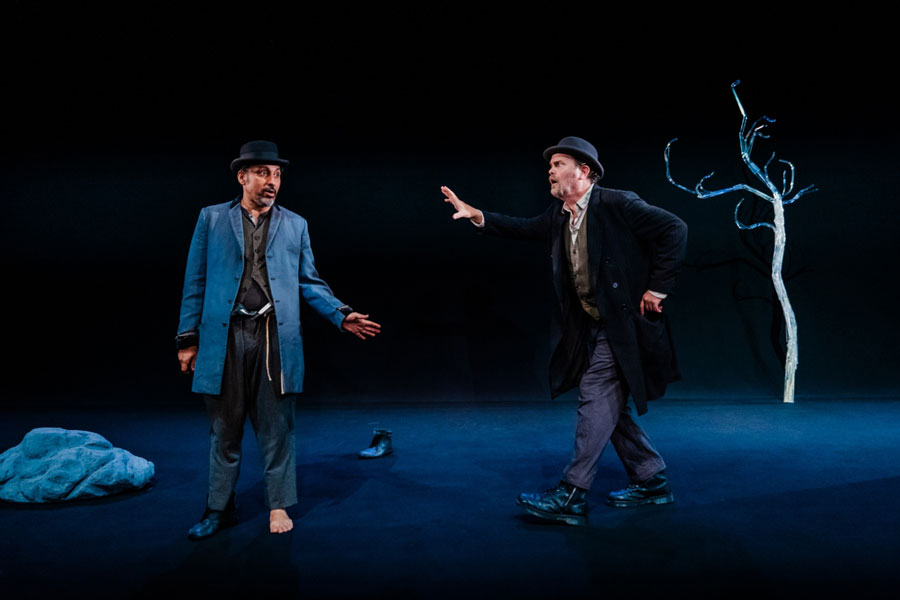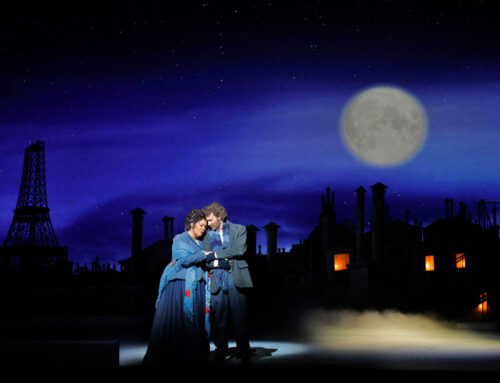The Geffen Playhouse staged a captivating production of Samuel Beckett’s Waiting for Godot, directed by Judy Hegarty Lovett in association with Gare St Lazare Ireland.
Geffen Playhouse Waiting for Godot
The two-act tragicomedy, considered one of the most significant English-language plays of the 20th century, is as poignant and meaningful today.

Aasif Mandvi (Estragon/Gogo) and Rainn Wilson (Vladimir/Didi); photo by Jeff Lorch
The Plot
Vladimir and Estragon wait and wait for the arrival of the elusive Godot, bored and doing what they can to pass the time. They reminisce about being together for 50 years, sleeping in ditches and eating rotting root vegetables. They repetitiously bicker and harangue each other about nonsensical observations punctuated with intense silence. When they reflect philosophically, it is typically about whether they should hang themselves from the boughs of a barren tree.
Mid-way in Act 1 they are interrupted by the domineering Pozzo and the subservient and tortured Lucky who entertain them. A young boy appears telling them that Godot will not come today but surely tomorrow, which he does not.
The Performance
There are audience laughs throughout, but the existential anguish may not be for everyone as evidenced by the empty seats after intermission. In a contemporary social context, I felt as if I was observing the day after day plight of homeless men trying to survive.
Rainn Wilson (Vladimir/Didi) and Aasif Mandvi (Estragon/Gogo) captivate as they adroitly play off each other with verbal as well as physical comedic and solemn subtlety. Their focus with each other and to the audience is the desire to be seen. Conor Lovett, who co-founded Gare St.Lazare Ireland, plays Pozzo with an imposing tone and presence.

Aasif Mandvi (Estragon/Gogo), Adam Stein (Lucky), Conor Lovett (Pozzo), and Rainn Wilson (Vladimir/Didi); photo by Jeff Lorch
Adam Stein portrays the mostly hunched over and silent Lucky. Stein elicits a rousing ovation as he comes to life with an extended absurdist philosophical soliloquy. The walk on role of the boy was performed by Lincoln Bonilla, who alternates with Jack McSherry.
Kaye Voyce’s scenic design and costumes, Simon Bennison’s lighting and Mel Mercier’s sound design come together therefore crafting an atmosphere of melancholic desolation.
Let me conclude with a quote from psychologist Nathaniel Branden.
“No one is coming to save you. No one is coming to make life right for you.
If you don’t do something, nothing is going to get better.”
The Geffen
Geffen Playhouse is a nonprofit and Artistic Director Tarell Alvin McCraney established the Theater as a Lens for Justice. This project will provide access to theater for populations impacted by incarceration, beginning with the 2024/2025 Season.
For upcoming performances at the Geffen Playhouse, visit the website – https://www.geffenplayhouse.org/
CLICK HERE to read more theater reviews, and find out about upcoming events HERE.






